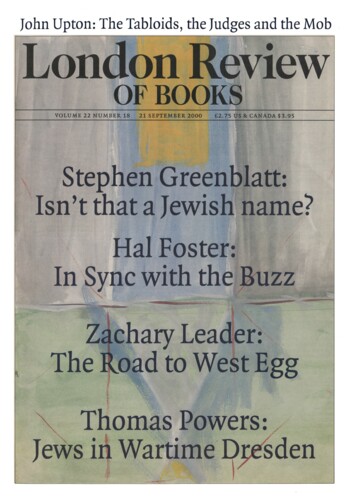JustBooks.co.uk, ‘believed to be the largest second-hand specialist book platform in Europe’, has conducted a survey of the nation’s reading habits. After questioning 291 people (you may not think that’s very many out of 60 million, but the interviews were ‘in-depth’ and ‘face-to-face’), they have reached various intriguing conclusions. Having decided that excitement is the best measure, they found that 77.3 per cent of those questioned thought reading ‘can be more exciting than watching a film’, 81.8 per cent thought it could be more exciting than TV and, ‘staggeringly’, 23.7 per cent thought it ‘can be more exciting than sex’. You could say that’s a bit like trying to decide whether a kilo is bigger than an hour; but even so, it’s slightly odd that 76.3 per cent of people think sex cannot (ever?) be more boring than reading. And what about reading about sex? Ah, statistics. The press release gives some details about the representative 291, claiming that ‘the majority (42.3 per cent)’ were aged between 21 and 35. How 42.3 per cent can constitute a majority is beyond me, but the thought that it might is a comfort when reading that ‘sadly for reviewers … 41.9 per cent said they were not influenced by reviews’: on the exciting platform of second-hand statistics, that’s only 0.4 per cent short of a majority – perhaps they could form a coalition with the 5.5 per cent who said they don’t know.
Yet another film version of Hamlet has been made, this time adapted for the screen and directed by Michael Almereyda. Bloomsbury will be publishing the book of the film next month, for the benefit of those 77.3 per cent who’d rather read a book than go to the movies. On the cover is a pouting Ethan Hawke (who played the Pip character in Alfonso Cuarón’s modern-day version of Great Expectations, 1997), and the film promises to be rather different from Mel Gibson’s decade-old Mad Max: Prince of Denmark. Plaudits for the script have been culled from the New York Times: ‘Intelligent and exhilarating … a new standard for Shakespeare’ – even better than last year’s Julius Caesar, augurs well for the future … something Scottish next time, perhaps? And the Los Angeles Times: ‘Exciting and provocative beyond all expectations’ – it opens with a terrific night-time scene on the castle battlements, where a ghost appears, and I’m very excited to find out what happens at the end.
Help is at hand for all those who find books exciting but are put off by the risk of developing Reader’s Thumb, the sedentary equivalent of Housemaid’s Knee or Tennis Elbow. Bookmate® has been developed by an inventor called Martin Boronte, who has ‘never seen anyone look comfortable holding open a paperback book’. The device, which can double-up as a bookmark, is a butterfly-shaped piece of clear plastic which is easily attached to the reader’s thumb by means of a rubber ring; the butterfly’s wings hold the pages open. ‘A paperback book has a tendency to close and therefore reading requires some physical dexterity, especially when reading with one hand’ – so if Bookmate® takes off, there’s a chance the ranks of that beleaguered 23.7 per cent of JustBooks interviewees might swell. To order your Bookmate® for only £1.50 (or thereabouts), visit the manufacturer’s website at www.tick.com.
For a more off-the-wall approach to probability, you could do a lot worse than turn to Luke Rhinehart’s The Book of the Die: A Handbook of Dice Living (HarperCollins, £9.99). The Dice Man, his 1970s cult novel, has enjoyed something of a revival in recent years, earning Rhinehart – among other dubious honours – the tag ‘novelist of the century’ from Loaded, the magazine ‘for men who ought to know better’, as if that made the fact that they don’t somehow all right. There’s plenty of New Age silliness in The Book of the Die, but it’s all done with an incredibly charming tongue in cheek. Perhaps the most charming episode of all, reflecting an attitude that would undoubtedly appal the proprietor of HarperCollins, is an exchange between Whim, ‘Son of the Lord Chance’ – ‘the Force in the Universe that likes to stir things up’ – ‘who has been sent to earth to try to find Ultimate Truth’ and is in some sense the book’s hero, and one of his ‘students’:
‘If you had a million dollars, Whim, what would you do?’
‘Invest it,’ Whim said promptly.
‘Invest it in what?’ persisted the student.
‘In a herd of unicorns,’ said Whim.
‘But unicorns aren’t real.’
‘That’s OK,’ said Whim. ‘Neither is the million dollars.’
A million dollars is allegedly what Little, Brown in the States paid Alan Watt for his first novel, Diamond Dogs, out at the end of the month (Duckworth in the UK, £9.99). The story begins: ‘I was angry. We were all at Fred Billings’s house. He lived in a farmhouse on the outskirts of Carmen. His father raised chickens.’ Monotony threatens. You long for a long sentence. It doesn’t look like a million-dollar novel, at least not over here, where it’s not even a hardback (note: ‘72.5 per cent of people said they could not judge a book by its cover’ – there are as yet no figures for how many cooks it takes to spoil a broth); but as it announces itself, in a Post-Modern way, as ‘A Post-Modern Thriller’, you have to wonder whether Watt hasn’t perhaps already invested his advance in a herd of unicorns.
Send Letters To:
The Editor
London Review of Books,
28 Little Russell Street
London, WC1A 2HN
letters@lrb.co.uk
Please include name, address, and a telephone number.

